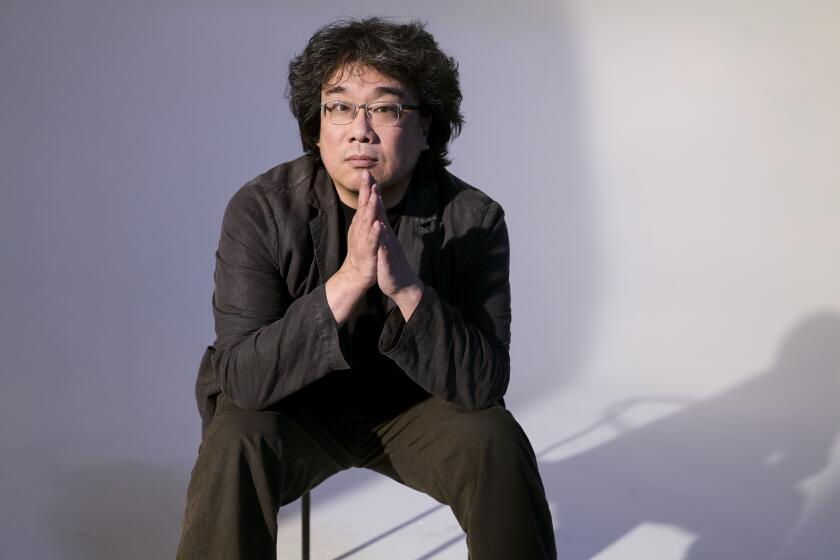‘Two Dollars’: Documentary on Millionairess
- Share via
Among the films screening in the continuing American Film Institute’s U.S. Independents’ Film Festival at the Monica 4-Plex is Stanley Nelson’s “Two Dollars and a Dream” (today at noon and 6:15 p.m.), a 50-minute documentary on Madame C. J. Walker, the first self-made American millionairess, and her high-living daughter A’Lelia. Madame Walker, who developed an oil-and-hot comb hair treatment for blacks, and her daughter’s stories are so remarkable that this film, as fascinating and informative as it is, leaves us eager to learn more.
Born Sarah Breedlove to ex-slaves in Delta, La., in 1867, Madame Walker--whose first husband was lynched--didn’t merely devise a method for making the hair of blacks more manageable, but created an industry that gave wide employment to blacks, especially to women, who sold a whole line of beauty and treatment products door-to-door. Madame Walker never permitted the use of the term “hair-straightener,” and several elderly surviving Walker friends and colleagues stoutly defend her against the charge that she was trying to make blacks look “more white.” These elegant, silver-haired ladies, none of whom are identified, also make it clear that in what were hard, heavily segregated times for blacks; Madame Walker was not merely a business tycoon but a dedicated feminist and philanthropist.
We learn that Madame Walker wore herself out and died at 52, enjoying her palatial estate on the Hudson--the Rockefellers and Thomas Edison lived nearby--for only two years. What she earned, however, her daughter, who died only one year older than her mother, spent. A’Lelia did become a major patron of the Harlem Renaissance of the ‘20s as well as its most lavish hostess. Despite her spendthrift ways, the company was able to open a large, handsome building in Indianapolis that not only contained its factory but also a fine theater and shopping center for blacks, the first structure of its kind in the country. The Walker Co. still exists but reportedly lags behind newer, more aggressive competitors; film maker Nelson is the grandson of the company’s longtime attorney and general manager, F. B. Ransom. There’s the stuff of triumph and tragedy in this mother-and-daughter saga, and reportedly Alex Haley is working on a book and miniseries about the Walkers.
AFI IndieFest will conclude Thursday with Lilyann Sievernich’s one-hour “John Huston and the Dubliners,” made during the production of Huston’s soon-to-be-released final film, “The Dead,” which his son Tony adapted from the last story in James Joyce’s “The Dubliners.” Ideally, this documentary shouldn’t be seen until you’ve first seen “The Dead,” a most eloquent screen farewell from a great director; also if you haven’t seen “The Dead” first you won’t likely be able to identify any of the mainly Irish cast apart from Anjelica Huston.
To watch “John Huston and The Dubliners” is a frustrating experience beyond the lack of name tags. It is technically adroit, gives a good idea of how Huston worked (quietly, firmly, confidently) and is enormously moving simply because its so often-larger-than life subject is no longer with us. Although Sievernich does confront Huston, seen frequently in a wheelchair and hooked up to an oxygen tank, with the question of impending death, which he responds to with calm acceptance, most of her questions are so uninspired that Huston is forced to turn dross into gold, something fortunately at which he was a past master. Sievernich leaves us wondering, too, why there is so little of Anjelica and nothing from veteran production manager Tom Shaw. It screens at 4 p.m. and again at 8:45, followed by a panel discussion to include Sievernich, Tony Huston and others. For full schedule: (213) 856-7707.
“The Jew in History and Legend” continues at the Westside Jewish Community Center with a screening Saturday at 7:30 of the long-lost 1921 Austrian silent, “The Wandering Jew,” which has been restored by Murray Glass of the Em Gee Film Library. Directed by Otto Kreisler, “The Wandering Jew” is a visually stunning epic in which episodes in tumultuous Jewish history are intercut with the life of Theodor Herzl, suggesting how they fired his Zionist vision. In structure and theme “The Wandering Jew” is strongly reminiscent of Griffith’s “Intolerance” and contains scenes that seem astoundingly prophetic and cruelly ironic in the light of the coming Holocaust. Rudolph and Joseph Schildkraut both appear in many roles. Information: (213) 938-2531.
More to Read
Only good movies
Get the Indie Focus newsletter, Mark Olsen's weekly guide to the world of cinema.
You may occasionally receive promotional content from the Los Angeles Times.









